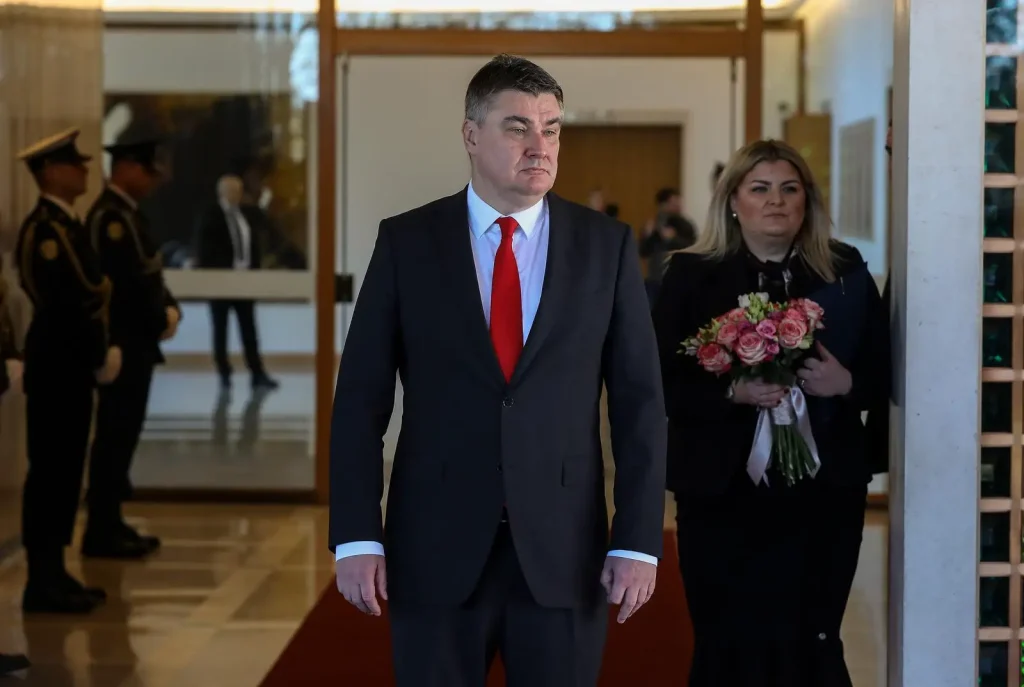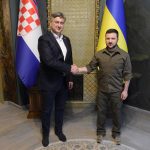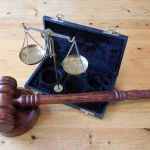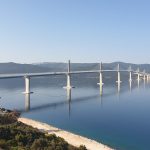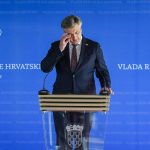The government is looking into what it can do when it comes to energy prices after the 1st of April this year
Energy costs are still causing a lot of concern among the general public and particularly among businesses who are struggling to pay their often extortionate bills. With an unusually mild winter seeing us avoid what could have been a much worse scenario, the government is now busy looking into what it can do when the measures they put in place expire (April the 1st, and it certainly is no joke). Claiming that the costs for energy would have been far higher and caused more issues had the government not capped their prices, Plenkovic has assured the public that his ministers are analysing the situation and seeing what they can do as we edge towards spring.
Prime Minister Andrej Plenkovic stated that without government measures, energy prices for many companies and individuals would have been much higher, adding that the ministers are currently analysing what the situation will be after April the 1st, given that government measures regarding these prices will last until March the 31st.
Given that some distributors have announced price increases of their own, journalists were naturally interested in whether the policy of regulating electricity and gas prices will continue from April the 1st, to which Plenkovic replied that the ministers of finance and economy are in charge of “preparing and analysing the situation for after that date”.
“We believe that the [energy] price situation will stabilise”
Yesterday, the CBS published the first estimate according to which inflation during the month of January of this year (when compared to January 2022) was on average higher by 12.7 percent, and compared to December, prices remained the same on average. Plenkovic rated that announcement as very good.
“Obviously, the trend of inflation growth that we had in the last months of 2022 is now slowly going down, which is in line with the forecasts of the government and the European Commission (EC). We believe that the situation with prices will stabilise and that at this time next year we’ll be talking about an annual inflation rate of around six percent, which would be very good considering these crisis circumstances,” said Plenkovic after the government session.
Government spokesman Marko Milic allegedly sent messages to Croatian Forests (Hrvatske sume) to get his friend a job in the classic ”uhljeb” fashion – he says not all is what it seems
Government spokesman Marko Milic recently had his alleged messages exposed by Nacional, in which he was organising for his friend to be employed within Croatian Forests. This type of employing peoples’ friends, cousins, former housemates and estranged aunts who are in no way qualified to do the task at hand has been clamped down on in the past (apparently), but still goes on in many sectors. While in certain circles of society, who you know being more important than what you know can be expected, but the government spokesman being allegedly engaged in it is something Plenkovic likely won’t stand for.
Despite the accusations against him and the messages published by Nacional, Milic spoke about the messages in which he apparently arranged ”uhljebljivanje” within Croatian Forests. Index asked Milic about the messages published by Nacional, and in his response, he didn’t dispute the authenticity of the messages, but claimed that the correspondence he had with the head of Croatian Forests at the time didn’t affect the employment of an individual named Niko Dujmovic, nor did it have any bearing on the fact that Dujmovic was given an employment contract for an indefinite period after those messages were sent.
However, he failed to explain why he even questioned the head of Croatian Forests, Krunoslav Jakupcic, about a certain man named Dujmovic at all, nor why, after Jakupcic wrote to him that Dujmovic could work there and that he’d employ him indefinitely, he replied with the words “Thank you very much”.
Marko Milic’s answer to Index has been translated and transmitted in its entirety below:
“Regarding what’s been published by Nacional, this is yet another in a series of inaccurate and misleading articles in which information is placed in such a way as to suggest the existence of illegal actions, which don’t exist. I’m aware that the aforementioned ‘correspondence’ has been circulating in the media space, and as far as I know, Croatian Forests has already given an answer to some media outlets clarifying the factual situation.
Regarding the employment of Niko Dujmovic, the correspondence between me and Mr. Jakupcic dates from September the 30th, 2019, and Niko Dujmovic was employed by Croatian Forests in accordance with the prescribed procedure and on the basis of a public tender from back in July 2018. Therefore, his employment took place more than one year before this correspondence, from which it follows that it had no influence on the establishment of the employment relationship of Mr. Dujmovic.
In addition, as far as I know based on the response of Croatian Forests, Mr. Dujmovic received an employment contract for an indefinite period during the second half of 2021, and that is almost two years after the published ‘correspondence’ took place, which clearly shows that the said messages had no influence on him getting a contract for an indefinite period.
As for the mention of the company Biomasa, I have no connection with it, I don’t know what it does, nor do I know the people who are employed there. It was very likely a specific complaint that was sent to the government at the time regarding the prescribed procedure (we receive such complaints on a daily basis), and we forwarded the case to Croatian Forests. Regarding the further actions of Croatian Forests, we didn’t have any instructions or influence, which is also evident from this correspondence.
Regarding the employment of Branko Filipeti, I have no influence on the content of messages sent to me by other people, to which I haven’t even responded. I don’t know this person,” Milic wrote.
Now we’ve seen Milic’s response, let’s look at the messages published by Nacional, allegedly sent by him:
“Niko Dujmovic” – this is the very simple message that Marko Milic sent to Krunoslav Jakupcic on September the 30th, 2019, while Jakupcic was still the head of Croatian Forests (before he was arrested).
“He’ll work [at Croatian Forests] for up to a year on a fixed-term basis – this is the normal way of doing things within Croatian Forests, and then we’ll accept him for an indefinite period. I heard that he’s good. Best wishes,” responded Jakupcic.
“Thank you very much, Kruno,” replied Milic.
“You’re welcome,” responded Jakupcic.
Milic has since gone on to further defend himself and these messages which he claims hold no weight by saying that USKOK (Office for the Suppression of Corruption and Organised Crime) hasn’t been in touch with him during an appearance on RTL. Croatian Forests have had their own say, saying that everything was done according to the law.
President Zoran Milanovic’s bizarre statements regarding Russia has confused the wider public, and now a professor from King’s College London has understandably asked what Croatia is trying to do and what it wants
In a longer interview for DW, security expert Peter R. Neumann (King’s College London) commented on the Western policy towards Ukraine, and also referred to the statements of Croatian President Milanovic about both Russia and Ukraine, which have been increasingly odd and problematic.
Peter R. Neumann is otherwise professor of security issues at King’s College London and the director of the International Centre for the Study of Radicalisation (ICSR), the world’s leading research institute dealing with issues of radicalisation and terrorism. After studying political science in Berlin and Belfast, Peter R. Neumann earned his doctorate at London’s King’s College on the subject of the Northern Irish conflict.
While we won’t bring you the interview translated in full, given that most of it focuses on the wider scope of the Russia-Ukraine war, we will publish what he said about Milanovic’s strange statements which have caused not only Neumann, but numerous other individuals on the European ans global political stage to ask what Croatia is even trying to say or do by allowing the president to make such bold statements. Neumann has even wondered if Croatia is trying to state that it wants to leave the EU by allowing Milanovic the space to come out with such politically damaging things.
One year after the start of the war, how united is the West in terms of its policy towards Russia? Although Western leaders try to give the impression that there is unity in the response to aggression, the fact is that there is still no consensus. Even in the European Union, there is no consensus about this correct policy, as you call it,” asked the interviewer. Here is Neumann’s response:
”It’s true that there is no consensus in the West about the policy towards Russia. But it is also true that Vladimir Putin, when he attacked Ukraine on February the 24th last year, thought that this consensus would be even weaker. What has happened in the West over the last year has been surprising, it’s surprising how united the West really was, and that there are very, very few countries that oppose the Western line, for example Hungary.
I think that surprised Vladimir Putin as well. When he launched the action on the 24th of February last year, he believed he would march into Ukraine, and that countries like Germany were too weak to defend against it. That is, he believed that there would be no Western unity.
That was a miscalculation. And that is why it’s now important to preserve that unity of the West, because only with that unity can Ukraine be sent as much aid as it needs to be able to strike back at the aggressor.
But it isn’t only Hungary which has taken the stance it has. And it’s not only Orban. He isn’t really alone in this regard. You must have heard the latest statements of Croatian President Zoran Milanovic, who criticises the Western policy, opposes sending weapons to Ukraine, says that a military solution to the war is not possible, that is, that Crimea will never be part of Ukraine and that the West annexed Kosovo. The president of a country that is a member of the European Union and NATO is saying these things…
I find that problematic. I think it’s important that such statements aren’t made because they are an encouragement in this situation, especially for Vladimir Putin. Because the Russians take advantage of such statements. Because they’re used for Russian propaganda, because they say: look, even Europe is not united.
And the fact is that the European Union, with the exception of Hungary, has so far been relatively united in its support for Ukraine. It’s important to continue this policy. I don’t know what Croatia wants to achieve with this? What does it want to do here? Does it want to be on Russia’s side? Does it want to leave the European Union? Does it want to lead a completely different policy from other EU countries? What exactly is the strategic goal for Croatia here?
In my opinion, such statements have no strategic purpose, except to encourage Vladimir Putin and offer him yet more new propaganda material.”
Milanovic has been busy deflecting, turning the attention away from his comments on Ukraine and Russia to the aforementioned scandal about messages sent to employ people within Croatian Forests. Using every possible opportunity to take a swipe at HDZ (which, let’s be honest, are numerous anyway), Milanovic stated that the situation with these messages and ”uhljebs” is ”worse now than it was twenty years ago” before turning the attention to Plenkovic once again. He has also been busy clearing up after generating a very positive response from Serbia, of all countries, for claiming that yes, Kosovo was indeed ”stolen” from Serbia. We’ll look into that below…
Milanovic gets a round of applause from Serbia after claiming that Kosovo was stolen from it. He has since admitted that he ”could have worded it differently”
”Serbia will have to recognise Kosovo eventually in some way,” President Zoran Milanovic said this week, adding that Belgrade must understand that it will be the one to emerge from the “Serbian-Russian romance” as the scorned lover.
Here in Zagreb, at a press conference with the new Slovenian president, Natasa Pirc Musar, Milanovic said that “some things must change” in Serbia in order for it to be more inclined to the West where it will apparently be “welcomed”.
“The situation in Ukraine is the beginning of the end of this Serbian-Russian romance in which Serbia will realise that it is the scorned lover,” said the Croatian president, adding that Serbia and the Kosovo issue “bothers Russia.”
“Russia is trying something with Ukraine and the example of Kosovo sticks out like a thorn in the eye. Russia will have to recognise Kosovo at some point or pretend to recognise it in order to legalise what it is doing in Ukraine. That’s the reality,” Milanovic said, adding that “there is no love” between Belgrade and Moscow, but that it is merely an interest in which Serbia serves Russia.
The Croatian president also said that Serbia “will have to recognise Kosovo in some way”, and Kosovo’s politicians, “his friends”, will have to give status to the Association of Serbian Municipalities, “which they agreed to and signed”.
Regarding his recent statement that ”Kosovo was stolen from Serbia”, Milanovic said that this is a fact because Belgrade didn’t agree to it. “Serbia was left without Kosovo, it did not give it up voluntarily, it lost it during the war,” said Milanovic.
“I could have said differently, that Serbia was left without Kosovo or that Kosovo was excluded from Serbia, but I guess we all agree that Kosovo was part of Serbia,” said Milanovic, adding that he does not have to convince anyone of his attachment to the Kosovo Albanians. He also said that he always invites statesmen from countries that have not recognised Kosovo to do so.
To the Serbian tabloids that reacted positively to his statement about the apparently ”stolen” Kosovo, Milanovic responded with the title of Larry David’s comedy series: Curb your enthusiasm. They won’t like this now.”
For more on Croatian politics, make sure to keep up with our dedicated section and follow our Week in Croatian Politics articles which are published every Friday.

